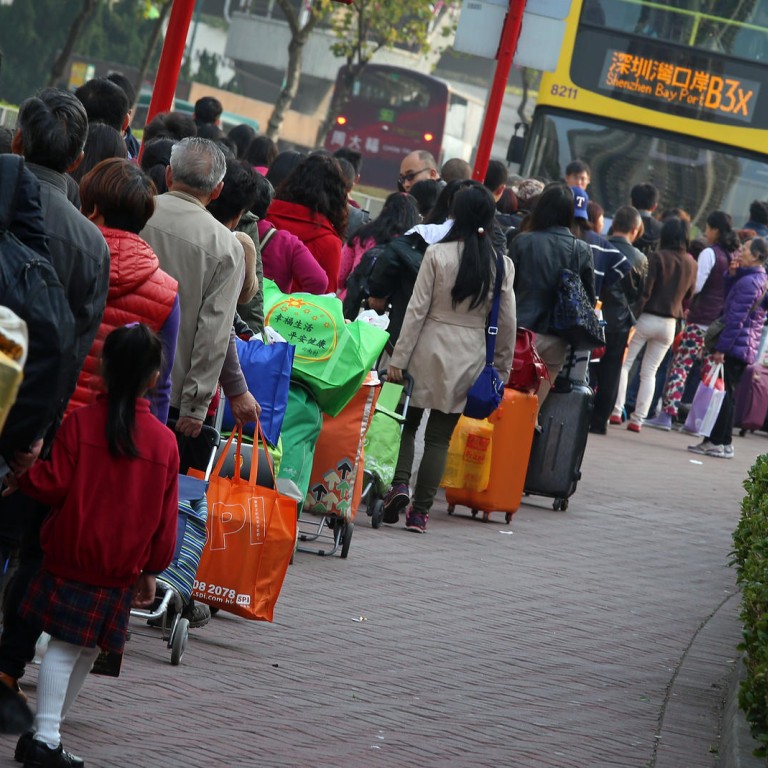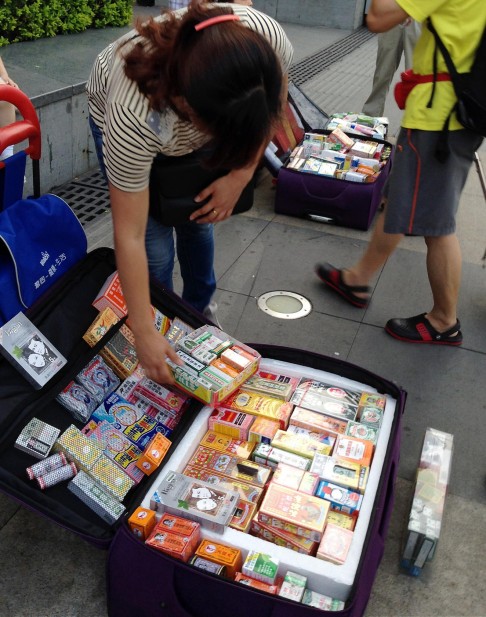
A town selling its soul: parts of Hong Kong transformed by mainland shopping frenzy
Mainland shoppers and parallel traders have transformed the face of Tuen Mun. Some welcome it, others say that enough is enough
These days, a common sight around a bus station in Tuen Mun is a long line trailing all the way into the street. A bus arrives every 10 minutes. But a queue of more than 100 people, armed with bulging bags and multicoloured suitcases, often forms the moment one vehicle leaves.
They are mostly mainland Chinese shoppers who want to get on the B3X bus, which takes them to the Shenzhen Bay border crossing in about 30 minutes. Three Citybus employees help passengers board. They also attempt crowd control so that when a bus starts to fill, only those without any luggage get to board to allow the queue to move.
"It's like they're moving house," says Suen Wai-yip, a B3X bus driver since 2007. An online video making the rounds shows one bus driver complaining to her passengers that they were using her bus as a truck.
The influx of parallel traders and mainland tourists has transformed the face of this New Territories town: apart from the long bus queues, shops selling snacks and gifts and pharmacies are opening in industrial buildings as well as the city centre. Some merchants have opened up stores in industrial buildings, at the risk of violating the terms of their lease.
The crowds have grown in the lead-up to the Lunar New Year on February 19 as mainland visitors stock up on gifts and daily necessities for the most important festival of the year.
The bus drivers are not the only ones complaining. Tuen Mun residents are also bristling from having to jostle with these day-trippers in the streets and the shops. They have complained to their district councillor and about 800 of them turned up yesterday at a protest rally.
The simmering tensions are threatening to become yet another case of the deepening mainland-Hong Kong divide as locals grapple with the rapidly changing character of their city.
The authorities are stepping in, but residents say too little is being done to ease their woes.
Last Tuesday, the government warned merchants to stop using industrial premises for shops, saying it was "very concerned" about the impact of such trading activities on residents' daily lives, in particular in North district, Yuen Long and Tuen Mun. A government spokesman said Chief Secretary Carrie Lam Cheng Yuet-ngor had ordered the relevant government departments to crack down on parallel-trading activities.
Wong Yee-ha, a Tuen Mun resident behind the "Love Tuen Mun" Facebook group that held yesterday's rally, says there is a lack of regulation in managing the crowds and she has great sympathy for affected residents.
"When Hong Kong's economy becomes dependent on mainland tourists, the big corporations are the ones that benefit, not Hongkongers. We have to deal with the nuisance and get none of the benefit," Wong said.
"I'm sick of these visitors. They're rude; they don't apologise when they bump into people with their handcarts and suitcases. They're always squatting on the ground organising their purchases. I see this every day."
She says she has been hurt four or five times by tourists careless with their suitcases. The most recent incident was last December, when someone ran over her foot with a suitcase and she ended up with bruised toes. One of her friends, she says, was injured so badly his toe bled. In all such ugly encounters, the culprits just fled, she claims.
At the very least, Wong says, the bus companies must enforce the luggage limit of 5kg and 0.1 cubic metres so that the streets do not get congested. She has made a complaint to Junius Ho Kwan-yiu, a district councillor for Tuen Mun. Ho says he has received at least eight similar calls from residents in recent weeks.
The growing numbers of visitors to Tuen Mun can be traced to 2009, when visa rules were relaxed and Shenzhen residents were allowed to apply for multiple-entry visas. Before that, visas were given on a single-visit basis. That scheme was introduced in 2003 to boost Hong Kong's economy, which had been hit hard by the Sars outbreak.
The eased visa regulations have brought a lot more daytrippers to Hong Kong to buy necessities like infant milk powder. In 2003, the number of visitor arrivals from the mainland was slightly more than eight million; in 2013, there had been a fivefold increase to 40.7 million, and the figure continues to rise. Last December, mainland visitor arrivals jumped 13.2 per cent year-on-year to 4.4 million, according to the Hong Kong Tourism Board.

Many of the Shenzhen residents who pour into Tuen Mun buy baby products. Six years after the tainted milk scandal of 2008, they say they still do not trust the mainland's baby formula.
Many of the shoppers, some of whom resell the products on the mainland, take the B3X bus that gets them directly to Tuen Mun from Shenzhen Bay.
Suen, the B3X bus driver, says he sees some mainland shoppers - who are clearly resellers - using the bus multiple times in a day.
One of the tourists waiting for the bus, who wanted to be identified only as Hu, was lugging two bulging plastic bags full of infant formula. The 26-year-old from Shenzhen said he had just come to Hong Kong in the morning and was returning home the same day.
"The quality of the products here is better, we trust them," Hu said. "I can't remember how many times we've been to Hong Kong. There have been so many trips."
In the industrial buildings where merchants have set up shop, business is still flourishing despite the government warning. Cherry Ban Xiaojun, a 36-year-old Shenzhen resident, emerged from one such building with a small black suitcase and a large bag of diapers on top of it.
"Products here are safer," Ban says. "They're not particularly cheap. Actually they're more expensive compared to what I can get on the mainland, but I feel like the quality control is better."
Ban says she heard about the shop from the messaging service WeChat, as well as from friends. The shops prominently display their WeChat account numbers. Samson Ng, who works at one of them, says they have local customers too, though they mostly come at the end of the work day. Ciggo Baby, the shop where he works, has been open for around two months.
"There are lots of shops like this in the building. You can see the ads downstairs. The first and second floors, for example," Ng says.
He says the shop does about HK$50,000 to HK$60,000 worth of business a day, and that they're close to breaking even.
Candy Lee owns Kissbaby, another baby products store on the 19th floor of Mai Kei Industrial Building. Her store has been in the building for over a year now. She moved to a bigger space last September. But after last week's government warning, she says her business has gone down by around 15 per cent.
Lee says that when she signed her lease, she made it very clear she intended to open a store. Commenting on the government crackdown, she said: "I asked the Lands Department and they said it's nothing against my shop … They said it's a crackdown on all shops inside industrial buildings. So I asked how they define an industrial building versus a commercial one. A lot of industrial buildings are used as classrooms, studios, even churches. Are you going to close all of them?"
She says her landlord is negotiating with the Lands Department and she is not moving unless she is forced out.
Lee, who is also a Tuen Mun resident, says she understands the complaints against mainland visitors, but points out that her fellow residents should be more accepting of these tourists who spend good money in Hong Kong.
"I don't discriminate between local and mainland mothers; I serve all of them. I'm a mother myself," Lee says. "I have a Manning's right below my flat. Getting diapers or infant formula isn't a problem for me; it's not like that for mainlanders. They may come across fake or really bad infant formula. If Hong Kong can sell them high-quality baby products at a reasonable price, I don't think it's a bad thing."
Lee says rather than rail against the mainlanders, Tuen Mun residents could come up with suggestions to better manage the crowds. For example, she says: "If you think suitcases are a nuisance, then why not go to the malls and see if they can put in more lockers so mainlanders can store their luggage."
District councillor Ho says it's time to rethink the visa scheme because Hong Kong may lack the capacity to cope with so many visitors.
"I don't want any hate or animosity. If mainland visitors have so much confidence in our products, then we should see this as a positive thing. We have to look at how much extra capacity we have," Ho said. "Why not make new shopping destinations for mainland visitors? It's not like we haven't done this before."
Ho points to Chung Ying Street in Sha Tau Kok as an example. The street is on the border between Hong Kong and the mainland. It was a major shopping and tourist attraction to mainlanders back in the 1980s and '90s. Ho says developing that area for visitors will take pressure off other residential districts, and then mainlanders do not have to travel as far as Tuen Mun.
"If Hong Kong products are so trusted by people on the mainland and we can use the opportunity to strengthen our own infrastructure, then it's a success for Hongkongers," Ho said. "We should seriously consider enhancing infrastructure for cross-border trade. Open it up."
